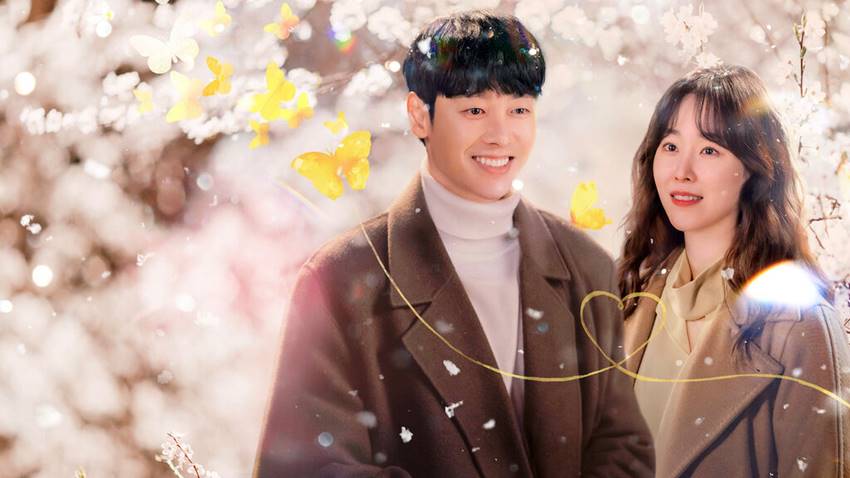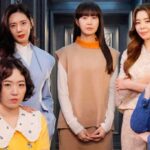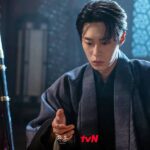
By Jae-Ha Kim
jaehakim.com
November 12, 2021
![]()
Kang Da-Jeong (played by Seo Hyun-jin)
Joo Yeong-Do (played by Kim Dong-wook)
Chae-Joon / Ian Chase (played by Yoon Park)
↑Note: Korean names denote the surname followed by the given name.
“You Are My Spring” deals with the aftermath of childhood trauma and how it permeates the lives of the victims, as well as their loved ones.
It starts off strong, focusing on Da-Jeong, who had grown up shielding her younger brother from their father’s abusive behavior towards their mother. As an adult, she appears well adjusted. A concierge at a fancy Seoul hotel, she is well liked and does her job well.
A good looking man starts following her around, asking her out, and she jokingly refers to him as a stalker. But watching this series, that’s how I initially viewed Chae-Joon. He appears to know her schedule and pops up when she’s heading home. Her friends advise her to be nice to him, because of all the effort he’s putting into wooing her. But the first thing that popped into my mind was, so? She’s not interested in him, so why should be encourage his behavior? Also, had he been unattractive, no one would’ve told her to be nice to him.
Her apartment is located in the same building that houses a psychiatrist’s office. Yeong-Do is good looking and kind — so nice, in fact, that he had previously married an actress, not because he loved her, but because she was suicidal and he wanted to keep her alive. They are conveniently divorced now, so you know what that means, right?
There is a murder mystery surrounding Chae-Joon and his twin brother, Ian Chase, who had both grown up in a child welfare center, before the latter was adopted to a couple in the United States. Their storyline is compelling, tragic and, to be honest, a bit confusing (especially during the flashbacks).
Initially, I thought it was the criminal aspect that would be this series’ strength. But the K-drama’s strongest moments occur when the interpersonal relationships are depicted — the burgeoning romance between Da-Jeong and Yeong-Do; the friendships between the primary couple and their extended family of friends.
“You Are My Spring” also depicts how lonely celebrities’ lives can be. Top actress Ga-Yeong (Nam Gyu-Ri) — who’s Yeong-Do’s ex-wife —is in a secret relationship with Patrick (Park Sang-Nam), a K-pop idol 10 years her junior. When news circulates that the two are dating, she automatically lies to save his career. Ga-Yeong knows his fans won’t accept his having a girlfriend, especially one who is divorced (and therefore not pure). His management punishes him for loving her by taking away his phone and access to a car. He alludes to the stress he’s under by asking to see Yeong-Do to talk through what clearly is a bout of depression.
I was heartened to see that the K-drama stressed the importance of mental health care and normalized it as something for everyone, rather than treatment only for weirdos or the clinically insane.
Airdates: This 16 episode series aired from July 5 to August 24, 2021 on tvN.
Spoiler Alert: Episode 4 shows the child welfare center where the twins grew up. In reality, it was operated by a cult passing itself off as a church. Their primary goal was trafficking children to the United States. In episode 6, viewers learn the backstory about how the brothers grew up, and how the boy who would become Ian Chase was essentially sold to a couple in the U.S.
Yeong-Do also spent a few months at the same facility, where his father hid him temporarily. Why? His brother, who would later die from congenital illnesses, needed organ donors and Yeong-Do was the perfect match. He had helped his brother in the past, but continuing to do so would further harm his own health. Knowing that one son would die, but wanting to spare his other child, their father did what he thought was best. In flashbacks, you can see that Yeong-Do was fed much better than the other children in the facility, which indicates that his father was paying the organization to care for him provisionally.
In reality, it wasn’t uncommon for indigent parents to leave their children temporarily at an orphanage or church, so that their kids would be fed and educated. But some parents, who didn’t understand the legalities of their actions, would return to find that their children had been adopted out without their permission. This was heartbreakingly depicted in “When the Camellia Blooms.”
© 2021 JAE-HA KIM | All Rights Reserved






2 thoughts on ““You Are My Spring” (너는 나의 봄)”